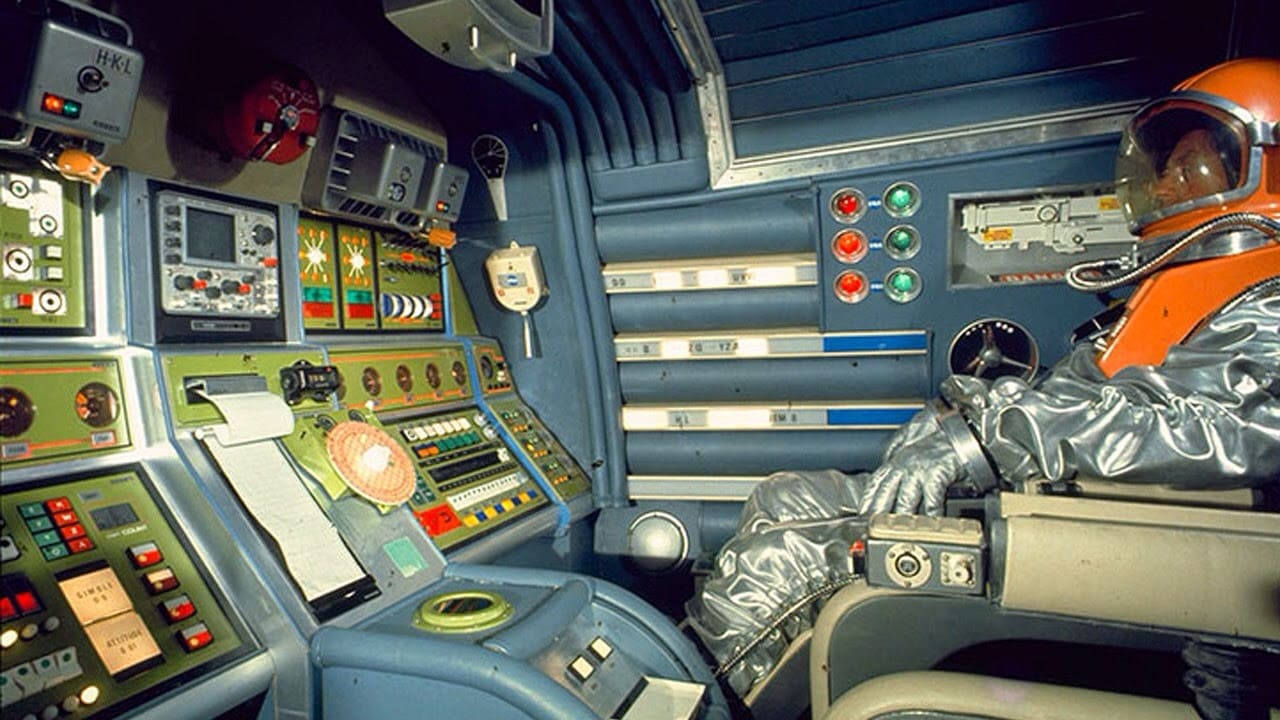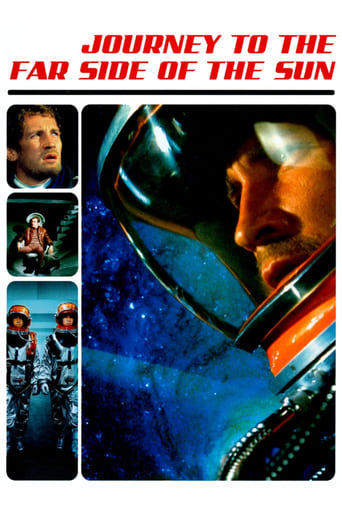

Contrary to other reviews here, I would say that this film is vastly over rated given its current IMDb score.When I read the IMDb description, I could imagine so many interesting ways such a plot concept could unfold, and I was excited to watch this film. But the plot adoption is very, very thin and just straight out disappointing. A good amount of time is spend on the characters, but it never gets to any kind of depth or reveals any kind of relation to the plot at all. There seems to be little point in showing us most things they do actually. I am not even sure if there is a point anywhere in this film at all.It is very obvious that the film tries to mimic the tranquil space/tech scenes of 2001 that came out just months before it, but it completely misses the point of how and why those scenes are used. In Journey to the Far Side of the Sun, mundane and completely irrelevant scenes are dragged out to the point where concentration and interest vanishes completely. Half way through the film, I was very close to switching it off or go watch something else due to boredom. Even a lot of the effects are quite obviously copied from 2001, but also very poorly so. Even if you skip the obvious 2001 comparison, the effects are still rather unimpressive even for their time. There are films from the 50s with more convincing miniature model scenes for instance. The soundtrack is nothing worth writing about either.If I had watched it as a child, I could probably have ignored its many short comings and liked it due to the sci-fi setting of the film. As an adult I find it hard to recommend it though. There are some interesting props and beautiful 60s fashion, but that is about the only good thing I have to say besides the awesome plot idea (that is very poorly executed).
... View More"Journey to the Far Side of the Sun" has such a great premise that it's a real disappointment that they makers didn't do more with it. The film actually comes to a close just when it should get going. Handled correctly it could have led to a spin off TV series!If you are unfamiliar with the plot, let me fill you in on the good stuff. A planet is discovered on the far side of the sun, in exactly the same orbital rotation as the earth but on the opposite side, which explains why it has never been seen from earth before. A spacecraft is sent out to investigate it, with two astronauts on board. The long journey ends with them crash landing on the new planet, and what they find there is beyond their wildest expectations.What you will see straight away when you watch this film is the trademark style of a Gerry Anderson production. Filled with miniatures models of groovy buildings and spacecraft, it brings to mind a TV episode of Thunderbirds or Joe 90 on the big screen. This is a mixed blessing as Gerry Andersons miniatures always looked a bit like toys - very detailed and beautifully crafted toys, but when mixed with live actors appearing on full sized sets, the differences start to become noticeable. However this is science fiction from 1969 so be grateful that they are of a quality as high as this. The rest of the film looks great too, space fashion in all it's 1960's glory litters the screen, beautiful women, snappy gadgets and gaudy décor are present in abundance. The camera work in the film is great, everything looks crisp and colourful, again in the same way the the TV puppet shows always appeared. The acting is pretty good too, from the two male leads Ian Hendry and Roy Thinnes (for the US audiences) and the supporting cast too.I had great fun watching this but my main gripe is the huge disappointment that I experienced after the film revealed it's "twist". The twist itself is great but from that point onwards the film has nowhere to go, and nothing to do with it's trump card. The ending seemed ridiculous to me, because it basically puts a stop to so many intriguing "what if's" that could have been dreamed up, but instead they chose a really bad pay- off for all the build-up that had been so wonderfully laid down.You should have a great time watching the first 80 minutes of this film, but the last 20 might well leave you unsatisfied. It looks so good and the pacing of the first hour is fantastic. I just wish things had been taken somewhere more exciting instead of thrown in the trash, which seem to me how the scriptwriters decided to end the story.
... View MoreI watched this movie when I was a kid (on video in the 1980s) and it was a bit of a childhood favourite, but I couldn't remember some key points so watched it again just recently on the net. I'm disappointed, needless to say. The ending is 'too' convenient. All the evidence is destroyed in a very 'forced' accident. That being said, it's still a good movie and good science fiction, when you stop to think about it. The models are great and the casting and performances are very good, along with the music and set designs and the futuristic vision with all the nifty gadgets. All I can say about the movie philosophically is that the idea of a counter-earth is Pythagorean: https://en.wikipedia.org/wiki/Counter-Earth. Now as to the "point" the movie was trying to make. My guess, and this is only a guess, is that its about trans-Atlantic relations. You have the European space agency, led by a British guy (Jason Webb ) but with all the funding coming from the French and the Germans (who are very miserly), and the Americans only pitching in when it becomes discovered the Soviets are spying on the new find of a tenth planet (in the same orbit as Earth, but on the opposite side of the sun). The super secret nature of the mission to this new planet also stops the public knowing about the startling discovery and so all the evidence of of the new planet being an opposite copy of Earth. (This is a theme in 2001 A Space Odyssey since the Americans keep the discovery of the monolith on the moon a secret and it was the mistrust and paranoia that Hal Suffered from that made him kill of the crew of the Discovery). Note that the last scene has Jason Webb, old and senile in his mansion, crashing into a mirror when he remembers the mirror image Earth, taking the secrets with him to the grave.There's also the American astronaut hero (Colonel Glenn Ross) and his annoying country-girl wife. She makes fun of his manhood, not wanting to have kids from him, saying he's sterile because of radiation from space, only to discover she's taking birth control bills behind his back. I guess she wants a domesticated husband she can control. Contrast this to the lovely security controller from the European space agency, Lisa Hartmann, a hint that the Americans should stick it with Europe (under British leadership of course) if they want to win the Cold War and explore the solar system. It's this over commitment that gets the hero killed in the end, despite Lisa's warnings that he no longer owed Webb anything. Note the colour contrast too, with the hero's wife being a (wild) redhead and Lisa being a decent blonde!On a final plus note works of art, whatever their quality, are always ageless, gaining relevance when you least expect it. Hence the curious situation the UK is faced with now with the vote on continued membership in the EU. If you can't lead the Europeans, be a member on your own terms, you go it alone. So the movie is, tragically, quite prophetic. (Notice also the scene in Portugal, making Southern Europe look poor, primitive, not unlike the situation today with the debt crisis Spain and Greece have found themselves in).So, all in all, I'd say it's a good movie and has stood the test of time, but nothing of course compared to '2001' or 'Alien', although it's still better than Prometheus!Hope you aren't offended, Emad El-Din Aysha, a freelance movie reviewer in Egypt:
... View MoreI usually enjoy these stories of duplicate universes or staged time changes. James Garner's "Thirty Six Hours" was fun. Garner plays a US officer with knowledge of the D Day landings in World War II. He's captured by the Nazis, who pose as Americans, tell him he's been suffering from amnesia, that the war was over six years ago, and -- by the way -- he knew all the details about the D Day landings, didn't he? Everything is rigged to convince Garner than it's six years later than it actually is. But small puzzling discrepancies appear, one by one, and they add up. Then the movie falls apart at the end.In the early 60s, an hour-long episode of "The Twilight Zone," called "The Parallel," sketched out the story of an astronaut who experiences a curious flash of light in mid-flight. When he returns to Earth, he finds everything just as it was, but again with some minor but inexplicable differences. The house now has a picket fence. His rank has mysteriously changed (two grades up). And both he and his loving wife and daughter sense there is something strange going on. And there is -- he's landed in a parallel universe where everything is ALMOST the same as it is on earth, but not quite.I've spent some time on these two earlier stories because both of them are so much superior to this piece of derivative junk. Essentially, "Journey to the Far Side of the Sun" is a remake of "The Parallel", but with a bigger budget a far more irrelevant sub-plots. It's weakly written. Part of the fun of the earlier stories was in watching these discrepancies, each insignificant in itself, generate a sense of disquiet.Not here. After we're done with all the technological gadgets and neon lights and buttons being pushed and arguments that seem to come out of nowhere and for no reason, there are no tiny discrepancies. Instead, there is one BIG REVEAL. Yes, everything is the same in the astronaut's other world, except that the prose is written backwards. The moment Roy Thinnes notices this, he concludes that he's not back on Earth at all but on that planet on the other side of the sun. How can he make this intuitive leap? Nobody knows. Credo quia absurdum.The ending, while tragic, is unfathomable. They fix up a craft that will take him to his orbiting space ship but the rockets don't fire (or something) and the little model of his lifting body smashes into the space center so that the movie can end with a big explosion.The director was Robert Parrish, not an untalented guy, and an award-winning editor. For a time he was part of the John Ford stock company until, like so many others, he crossed Pappy and was exiled. He may have been asleep at the switch here, though God knows there's not too much you can do with a lousy script and a bland hero.
... View More